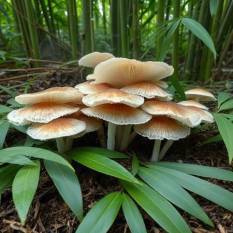SHILLONG, 4 July 2025: In the shaded silence of India’s rainforests and bamboo groves, a rare fungus known as the bamboo mushroom or Phallus indusiatus rises like a ghostly lace-clad figure. Revered in kitchens, valued in traditional medicine, and now eyed by agri-entrepreneurs, this forest jewel is carving a path from folklore to modern-day fortune.
Known for its ornate skirt-like structure, bamboo mushroom is a saprotroph—feeding off decaying wood and leaf litter. It plays a crucial ecological role, breaking down forest debris, nourishing soils, and sustaining biodiversity.
But its role goes far beyond decomposition. Bamboo mushrooms are fast gaining attention as high-value, medicinally potent mushrooms ideal for sustainable forest farming and export-oriented agribusiness.
Native to the Tropics, Rich in Promise
Found in the rainforests of Asia, Africa, and the Americas, bamboo mushrooms get their name from their frequent sightings in Chinese bamboo groves. In India, they appear in the Western Ghats, Northeast states, Odisha, and Chhattisgarh, typically after monsoonal rains.
In the wild, they grow from egg-like sacs, maturing in mere hours and emitting a musky scent to attract flies for spore dispersal—a biological marvel wrapped in fungal lace.
Cultivation: Delicate Yet Rewarding
Although challenging to grow, commercial bamboo mushroom farming has taken off in China with controlled conditions. Cultivators mimic rainforest floors using dark, humid chambers, organic matter, and temperature settings of 22–28°C with 80–90% humidity.
The yield is modest, but market prices are high, particularly for dried mushrooms used in luxury cuisine and wellness products. While not as simple to grow as oyster mushrooms, Phallus indusiatus is emerging as a premium crop for patient and skilled cultivators.
Culinary Delicacy, Vegan Superfood
With a crunchy yet delicate texture and mild, earthy taste, bamboo mushrooms feature in Chinese hotpots, gourmet soups, and plant-based haute cuisine. They are prized for both their aesthetic appearance and nutritional value, especially in Taiwan and Hong Kong.
Often rehydrated in broths, they retain their structure, making them perfect for slow-cooked dishes and vegan protein options.
Medicinal Marvel Rooted in Tradition
- Long used in Traditional Chinese Medicine (TCM), bamboo mushrooms are now under scientific investigation. Early research reveals a host of bioactive compounds:
- Anti-inflammatory properties support chronic condition management
- Antioxidants protect cells from oxidative stress
- Immunomodulatory effects may strengthen immunity
- Antitumor properties show potential in cancer research
- Antimicrobial traits assist in fighting infections
- Rich in polysaccharides, lectins, flavonoids, and sterols, bamboo mushrooms could soon feature in nutraceutical products and functional foods.
Culture, Conservation, and Community
More than just an ingredient, bamboo mushrooms hold cultural significance. In some Asian traditions, they symbolize grace, abundance, and impermanence. In rural villages, they're gifted to elders or used in ceremonial cooking.
Yet with popularity comes concern. Overharvesting in the wild is threatening fragile populations. Conservationists urge community-led cultivation, forest education, and stronger biodiversity safeguards.
Future for Forest Farmers
With rising demand, India’s tribal and forest communities stand to gain if supported with training, spawn distribution, and market access. Bamboo mushrooms offer a triple advantage:
- High economic value
- Low ecological impact
- Deep-rooted cultural relevance
Their delicate presence in the wild may be fleeting, but with careful cultivation and policy support, bamboo mushrooms can offer lasting value—for both people and the planet.




















